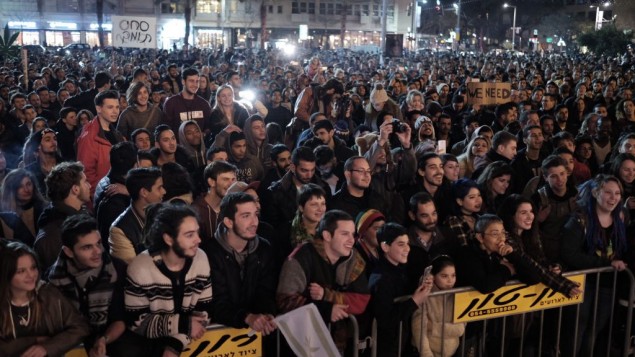You are here
Home 🌿 Recreational Marijuana News 🌿 Thousands Call for Full Weed Legalization at Tel Aviv Rally 🌿Thousands Call for Full Weed Legalization at Tel Aviv Rally

Knesset members join others urging public security minister to go beyond decriminalizing cannabis use.
Thousands of Israelis, including two lawmakers, demonstrated Saturday night for the full legalization of cannabis, urging the government to go beyond the recently announced measures to decriminalize use of the drug.
Among the estimated 3,000–5,000 people who gathered in Tel Aviv’s Rabin Square were MKs Sharren Haskel of the ruling Likud party and MK Tamar Zandberg from the opposition Meretz party.
Protesters urged Public Security Minister Gilad Erdan to enshrine in law recent changes he approved to hand out fines to offenders rather than prosecute them, and asked him to go further by fully legalizing the use of cannabis. Some called on the government to regulate the marijuana market to prevent sky-high prices.
“At first they laughed at us, then they belittled us, and in the end we won,” Haskel told the crowd, referring to the changes in regulations that Erdan said last month he would adopt. “As long as I am in the Knesset I will continue to push the matter until there is complete decriminalization.”

Meretz MK Tamar Zandberg speaks at a demonstration in favor of legalizing marijuana, held in Rabin square, Tel Aviv, February 4, 2017. (Tomer Neuberg/Flash90)
“This is a health campaign, a campaign for quality of life,” Zandberg declared.
“I call on the government to recognize that using cannabis is not a criminal or administrative offense,” said Oren Leibovich, editor of the Israeli online magazine “Cannabis.”
“There is tobacco everywhere, and Ritalin in every classroom, yet no one considers preventing their use,” he said.
Leibovich called for regulation of the market, which, he suggested, could then be taxed, pulling in billions of shekels to state coffers compared to the millions the state would make from fining users.
In his announcement last month, Erdan said he would be adopting proposals put forward by the Anti-Drug Authority to endorse the “Portugal Model,” in which possession and use of the drug would be decriminalized and treated largely as a health issue.
The new tack will need to clear the cabinet, but with many lawmakers backing decriminalization, the move is seen as likely to gain ministerial approval.
Under the proposal, home use and possession of marijuana would carry no punishment but those caught smoking in public could be subject to a series of punitive measures.
First-time offenders would be charged a NIS 1,000 ($265) fine but would not have a criminal case filed against them. That sum would be doubled on the second offense.

Public Security Minister Gilad Erdan announcing new measures to decriminalize marijuana use, January 26, 2017. (Tomer Neuberg/Flash90)
Those caught for a third time could still escape prosecution on condition they accept a number of possible measures, including loss of their gun or driving license and participation in a rehabilitation program. Only those caught smoking in public on a fourth occasion would be subject to automatic indictment.
Erdan also said that minors under the age of 18 would only be prosecuted if they refused a rehabilitation program.
Erdan did not specify the amount of marijuana that would be subject to sanctions but the Anti-Drug Authority has in the past recommended that fines apply only for possession of more than 15 grams of marijuana.
Among Western countries, Israel already has one of the highest per capita rates of legal marijuana use, with over 21,000 people medically licensed to use the drug.
Israel is well-known as a pioneer in medical cannabis. Last summer, the government approved a plan initiated by Health Minister Yaakov Litzman to relax some of the medical cannabis requirements. The plan aims to expand the number of doctors who can issue cannabis prescriptions, remove limits on the number of marijuana growers, make cannabis available at approved pharmacies, and possibly eliminate the requirement for a permit from the Health Ministry so that just a doctor’s prescription will be sufficient.
420 Intel is Your Source for Marijuana News
420 Intel Canada is your leading news source for the Canadian cannabis industry. Get the latest updates on Canadian cannabis stocks and developments on how Canada continues to be a major player in the worldwide recreational and medical cannabis industry.
420 Intel Canada is the Canadian Industry news outlet that will keep you updated on how these Canadian developments in recreational and medical marijuana will impact the country and the world. Our commitment is to bring you the most important cannabis news stories from across Canada every day of the week.
Marijuana industry news is a constant endeavor with new developments each day. For marijuana news across the True North, 420 Intel Canada promises to bring you quality, Canadian, cannabis industry news.
You can get 420 Intel news delivered directly to your inbox by signing up for our daily marijuana news, ensuring you’re always kept up to date on the ever-changing cannabis industry. To stay even better informed about marijuana legalization news follow us on Twitter, Facebook and LinkedIn.





